Miele Classic C1 vacuum cleaner review
Miele Classic C1 Flex two-minute review
The Miele Classic C1 vacuum cleaner comes in three very similar and identically-priced options: a Junior version with a sectioned suction tube, a standard version with a telescopic tube and XXL handle, and a Flex version with a telescopic tube and an extra long, flexible crevice nozzle for cleaning difficult-to-reach places. In this review I tested the Miele Classic C1 Flex vacuum cleaner.
Although the Miele Classic C1 Flex is very well engineered and comes with an enormous amount of suction power – 800 watts of it – one questions whether a corded cylinder vac of this nature still has a place in the 21st century, let alone among the best vacuum cleaners. Aside from having to keep plugging it into different power outlets around the home and the extra baggage of having a long suction hose that makes it tricky to carry, the most awkward facet of this vacuum cleaner is the static brush head that makes it very strenuous to push on anything other than smooth hard flooring.
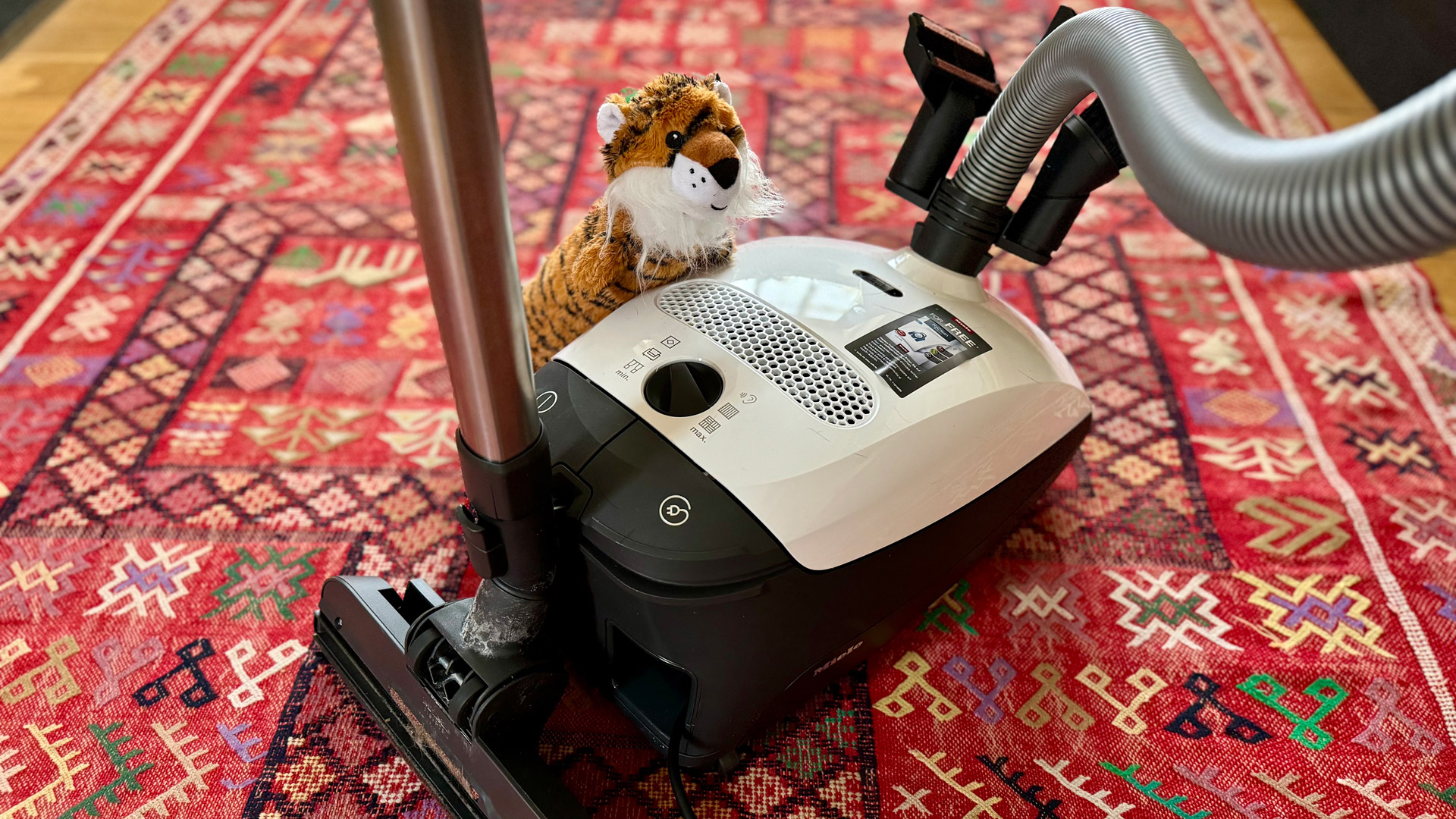
Budgetary concern may sound like a very valid reason for opting for a corded model like the Classic C1 Flex but when you bear in mind that today's marketplace is filled with many modern cordless alternatives from the likes of Shark, Samsung, Vax and Tineco that cost roughly the same while performing just as well on hard floor and even better on carpet, it starts to look like the Classic C1 Flex may have passed its sell-by date.
Miele Classic C1 Flex review: price & availability
- Price: $349 / £199 / AU pricing varies
- Available in a few variants (C1, C1 Flex, C1 Junior) for the same price
- Flex version only available in the UK
The pricing and options for the Classic C1 depend on where you live. In the UK, there are a few variants – the C1, C1 Flex, C1 Junior – all for the same price of £199. In the US, there's a Classic C1 for a list price of $349 or a C1 Turbo Team PowerLine for $469 (this one comes with an added 'Turbobrush' aimed at tackling pet hair specifically). In Australia the range isn't as clear-cut because it's not listed on the official Miele website, but there are various options available at third party retailers, at a range of prices.
In terms of value for money, it's acceptable but not amazing. There are plenty of competitors' options in a similar ballpark, which I think offer better performance.
- Value for money score: 3 out of 5
Miele Classic C1 Flex specs
Miele Classic C1 vacuum cleaner review: design
- Excellent build quality
- Easy to pull around
- Disappointing multi-floor head
Ask any modern tech-savvy householder whether they would ever consider buying a corded vacuum cleaner and they will probably tell you that that ship has sailed. I would tend to agree given that I am now so fully invested in everything cordless, from my stick vacs and robot vac to every outdoor garden power tool I have in the shed, including the lawnmower. Let’s face it, a corded cylinder vac like the Miele Classic C1 Flex I have on review here could never match a cordless stick for outright convenience and the ability to quickly vacuum a room before guests arrive.
On the flip side, corded cylinder vacs are quite often cheaper to buy than their equivalently powered cordless brethren and they'll never run out of power, which means you could vacuum every floor of a country mansion and then do the gatehouse and the rest of the neighborhood while you’re at it. Try that with a cordless stick vac and see how far you get.
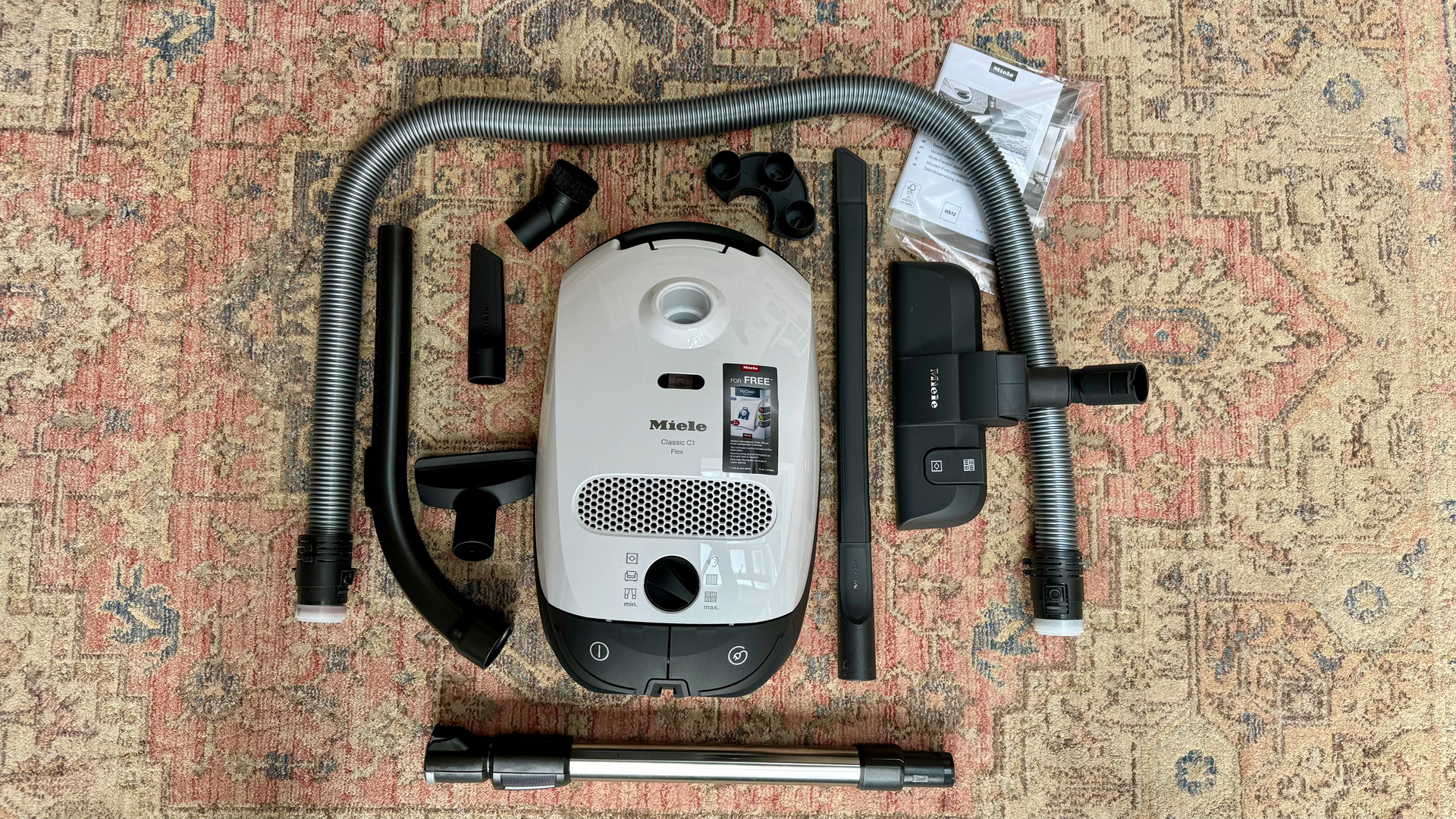
When it comes to household items, Miele is unquestionably one of the most prestigious brands around, and this is due in no small part to the overall quality of everything the company’s design team turns its hands to. After all, German-made Miele products are known to last for years – decades even – and this is testament to both the quality of materials used and the way they’re put together.
Take the Classic C1 Flex. Miele doesn’t advertise the types of plastic used in its vacuum cleaner bodies, but take it from me, this model is tough enough to withstand a fall down the stairs. I know this because I accidentally pulled my test model down a short flight and the body survived unscathed, even after clouting the wall at the bottom.
However, I am also mindful that there are are couple of oddities with the Classic C1 Flex that I find disheartening given Miele’s generally impeccable design ethos. For instance, other Miele cylinder vacs I’ve reviewed or owned have always had a handy little hideaway area under the lid to store away the provided detail tools. By contrast, this one comes with a plastic tool holder that clips on to the base of the concertina hose.
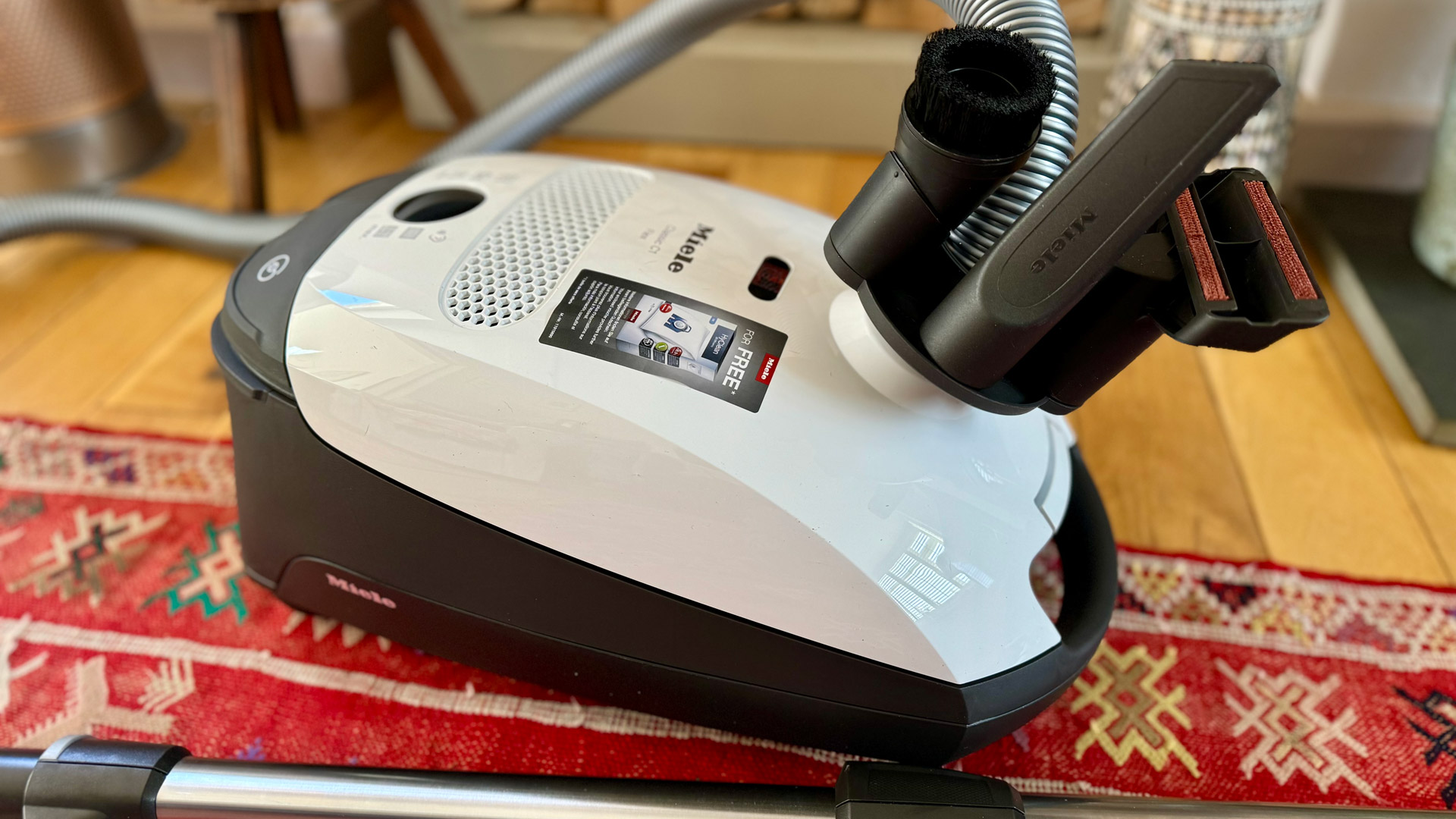
This not only looks incongruous but the tools have a tendency to fall off if snagged against furnishings when pulling the unit along. I have since resorted to removing the holder and storing the tools in a bag along with the other 1,001 detail tools I’ve gathered over the years. For the record, the Classic C1 Flex ships with a rectangular upholstery nozzle, a crevice nozzle, a dusting brush and, as the ‘Flex’ moniker suggests, a long flexible nozzle tool for cleaning in hard-to-reach places.
Another element I’m not at all keen on is the main brush head. This is a much more serious anomaly in my opinion because this sole item is key to how well the cleaner works and how easy it is to push and pull, especially when used on carpet. Where most modern vacs are equipped with an optimally-positioned motorized brush head that swallows most larger items while beating its bristles deep into carpet pile, the Miele Classic C1 Flex ships with an old-fashioned static head comprising a single layer of stiff bristles at the front and two flexible plastic strips just behind it.
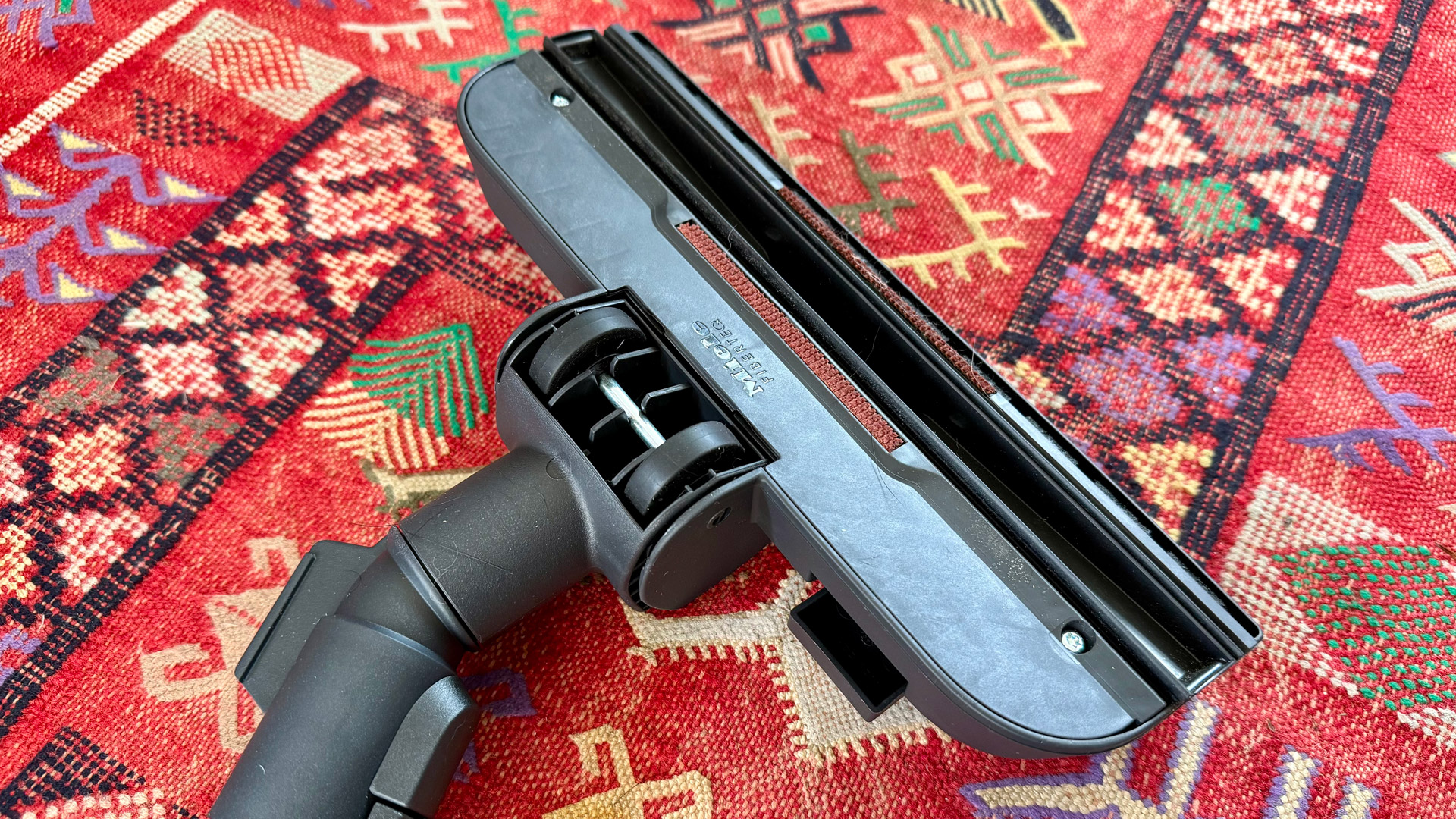
I’ll tell you more about this floor head in the performance chapter but, in short, it is extremely grippy when used on carpet and very difficult to push without breaking into a sweat. Given that its stablemate, the Miele Complete C2 Cat & Dog, ships with an easier-to-push motorised head for just £40 more, it seems like a missed opportunity on Miele’s part to not to equip all of its corded vacs with a motorised floor head.
The Classic C1 Flex features six levels of suction power which are accessed via a dial on the rear. Each setting is illustrated with an icon – curtains, upholstery, rugs, energy-saving, carpet and hard floor – but you can ignore that and just go for the most suitable level of suction for the task in hand. You can also reduce suction power further by opening the vent on the handle, though this increases the vac’s volume from a standard 71dB in full-power mode to an unpleasant 84dB.
Since this is a mains-powered model, you get 5.5 meters of spring-loaded cable tucked away inside its rear housing and this amounts to an operating radius of around 9m. To release the cable you simply pull it out to your required length and it will lock itself automatically. When finished, give the cable a short tug to release the locking mechanism and it’ll scoot back into its housing with the speed of an angry snake. However, you’re advised to hold the main unit in position with your foot when pulling the cable on hard floors or the whole vac will roll towards you. This is because the spring mechanism itself is strong enough to counteract the vac’s three extremely smooth-rolling, multi-directional micro castors. It’s not ideal, I know, but virtually every self-retracting cylinder vac I’ve ever used has had this very same issue.
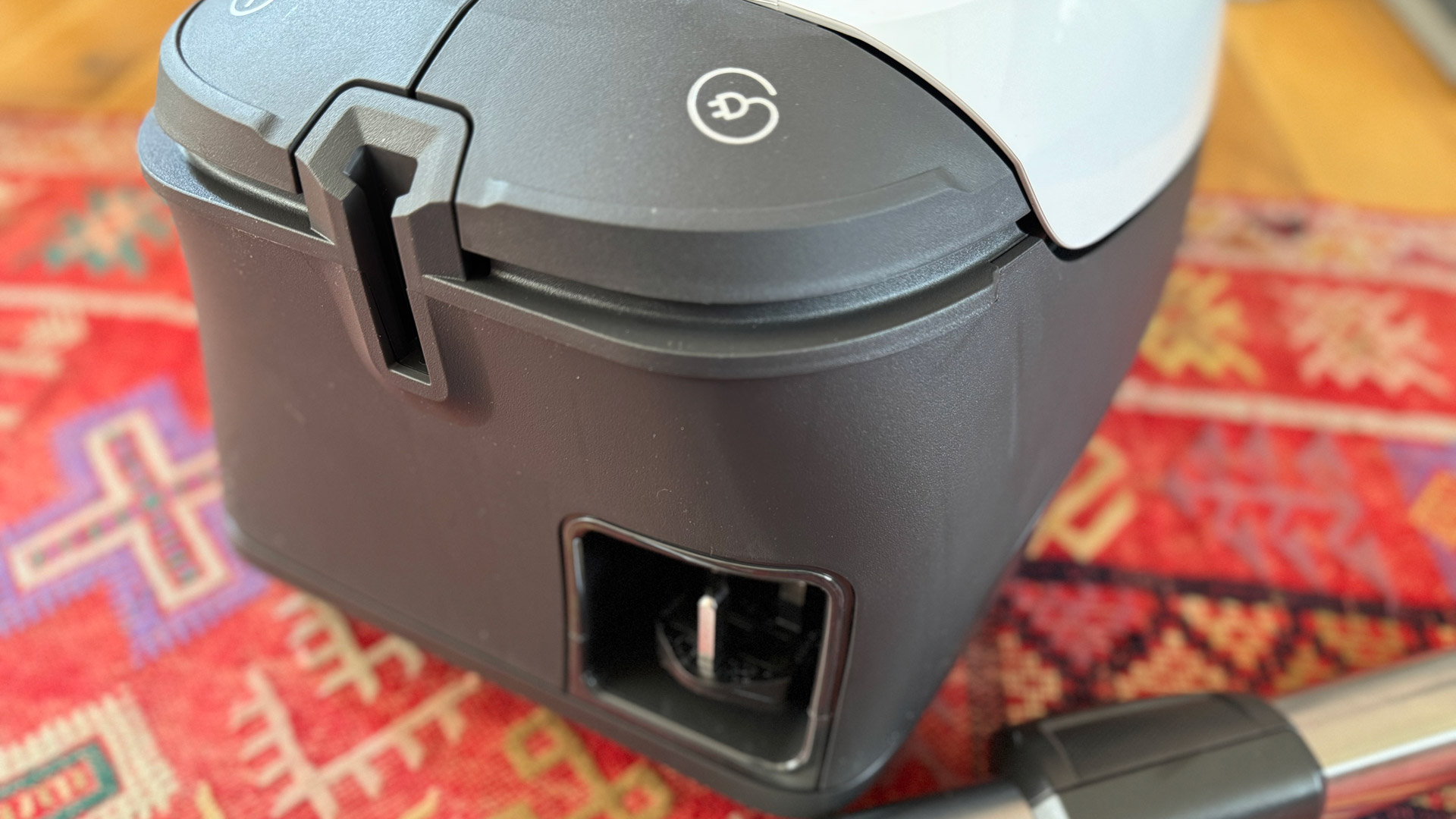
At 12lbs / 5.8kg, the Classic C1 Flex is light enough to carry from the under-stairs cupboard to its place of work and it can be stored either horizontally or vertically. Crucially, the floor head with ungainly hose attached can be clipped to the main unit in either orientation though it’s still a cumbersome package to transport from room to room.
One of the main highlights of all Miele cylinder vacs, including this one, is the way their stainless steel suction tubes can be lengthened or shortened by pulling on a sheath. It’s inarguably the most tactile element on this machine and a system I’d love to see on all vacs, including sticks.
Heading into the enclosed bin section, the Classic C1 Flex is fitted with a substantial 4.76qt / 4.5L microfibre HyClean GN dust bag and just behind it, Miele’s excellent AirClean filter which helps keep carpet dust smells to a minimum. As I explain in my Bagged vs Bagless article, I’m a big fan of bagged vacuum cleaners because they produce almost zero dust when emptying, are better at collecting fine dust particles like ash and they require very little filter maintenance. That’s true of the Classic C1 Flex. However, you only get one dust bag with this model and a set of four extra bags will set you back $22.99 / £13.99.
- Design score: 2.5 out of 5
Miele Classic C1 vacuum cleaner review: performance
- Excellent suction power
- Too difficult to push on carpet
- Dust-free emptying
I remember the days before cordless stick vacs took hold and you had to wrestle with a snake-like hose while pulling the main unit around behind you, which in turn was connected to a mains plug. It was a system of many foibles, including the cable getting snagged on furniture and the main unit turning turtle because you yanked it so hard out of frustration. You also had to keep unplugging it and plugging it back in every time you changed rooms.
Sorry to report, but this is one such model. However, the Miele Classic C1 Flex isn’t totally devoid of merit because it’s a sterling dust sucker on hard floors, even though it’s not great at collecting larger pieces of detritus like biscuit crumbs.
Power is something the Miele has in spades – all 800 watts of it. In fact, even in lower ‘carpet mode’, this vac’s limpet-like suction is strong enough to lift a rug off the floor. Which is why I say to ignore Miele’s power level guidance and just use the most suitable power level for the job in hand.
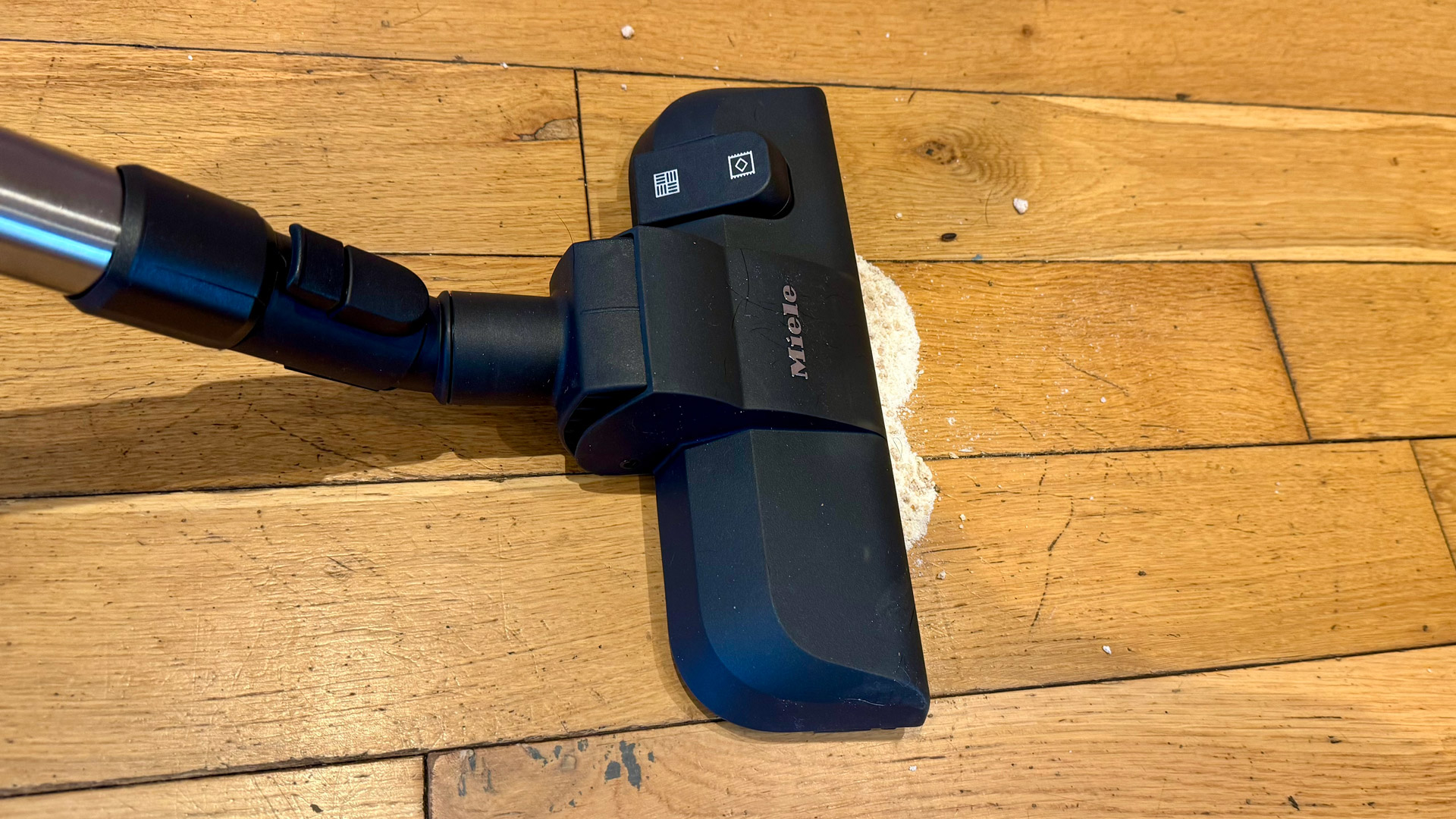
As per usual, my first hard floor test involved a good sprinkling of flour and crumbed biscuit with the main brush head set to ‘hard floor’ mode – i.e. with the front-mounted stiff bristle brush engaged. This brush is constructed like a castle battlement with nine small 5mm gaps positioned at regular intervals so larger items can slip through and up the suction tube.
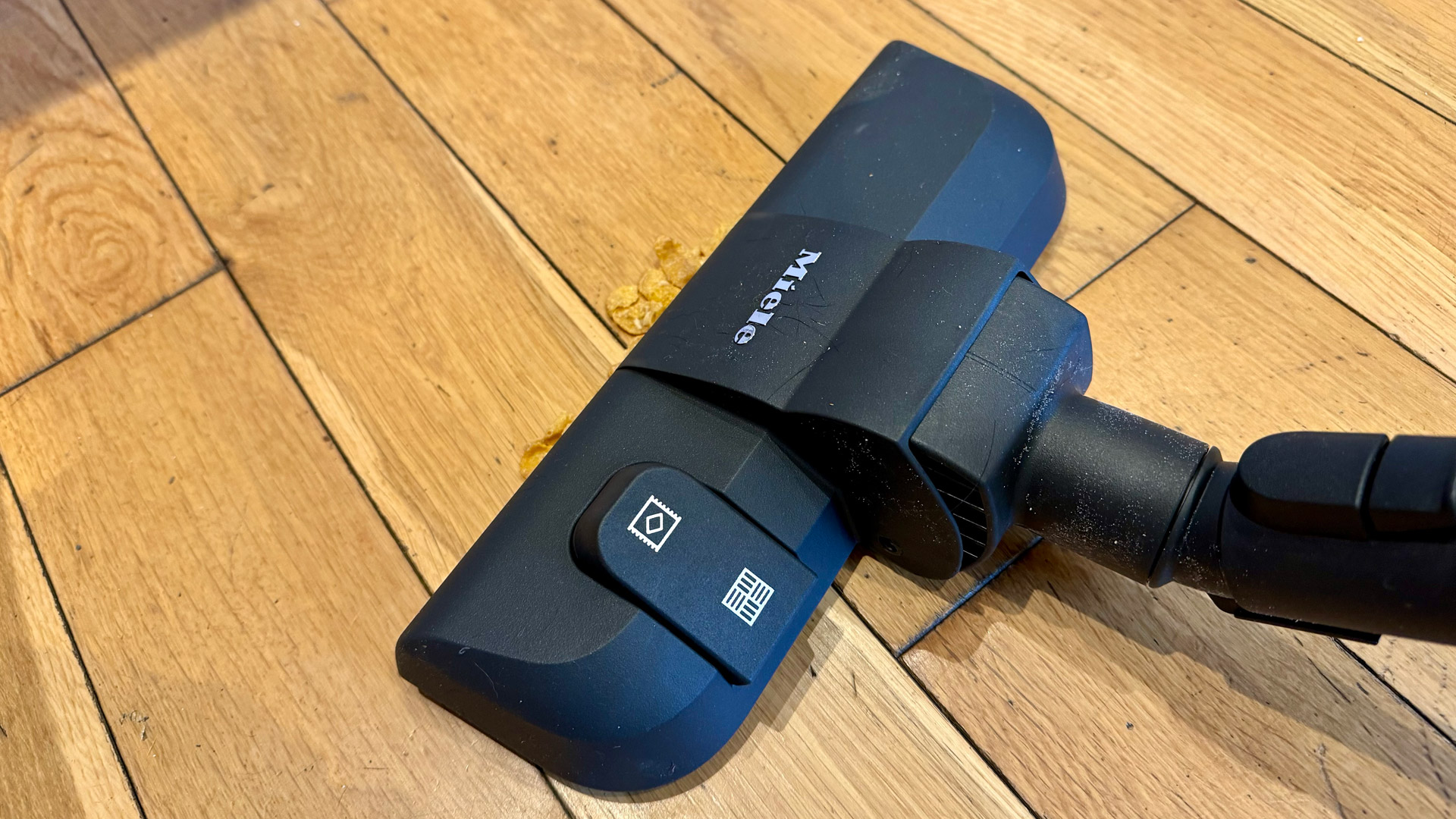
As anticipated, the floor head snowploughed most the flour and larger biscuit crumbs on the forward stroke so I simply lifted the rear of the head by a few centimeters and pulled it backwards. Everything vanished up the tube. I then tried it using a handful of Crunchy Nut corn flakes and, again as predicted, the head simply pushed everything ahead of it with no evidence of even a single flake making its way to the suction area. Again, I was able to collect every last flake when using the head in reverse and lifted at a short angle. No it’s not ideal, but that’s generally what happens when you don’t use a motorized head with a decent gap between the front of the head and the floor.
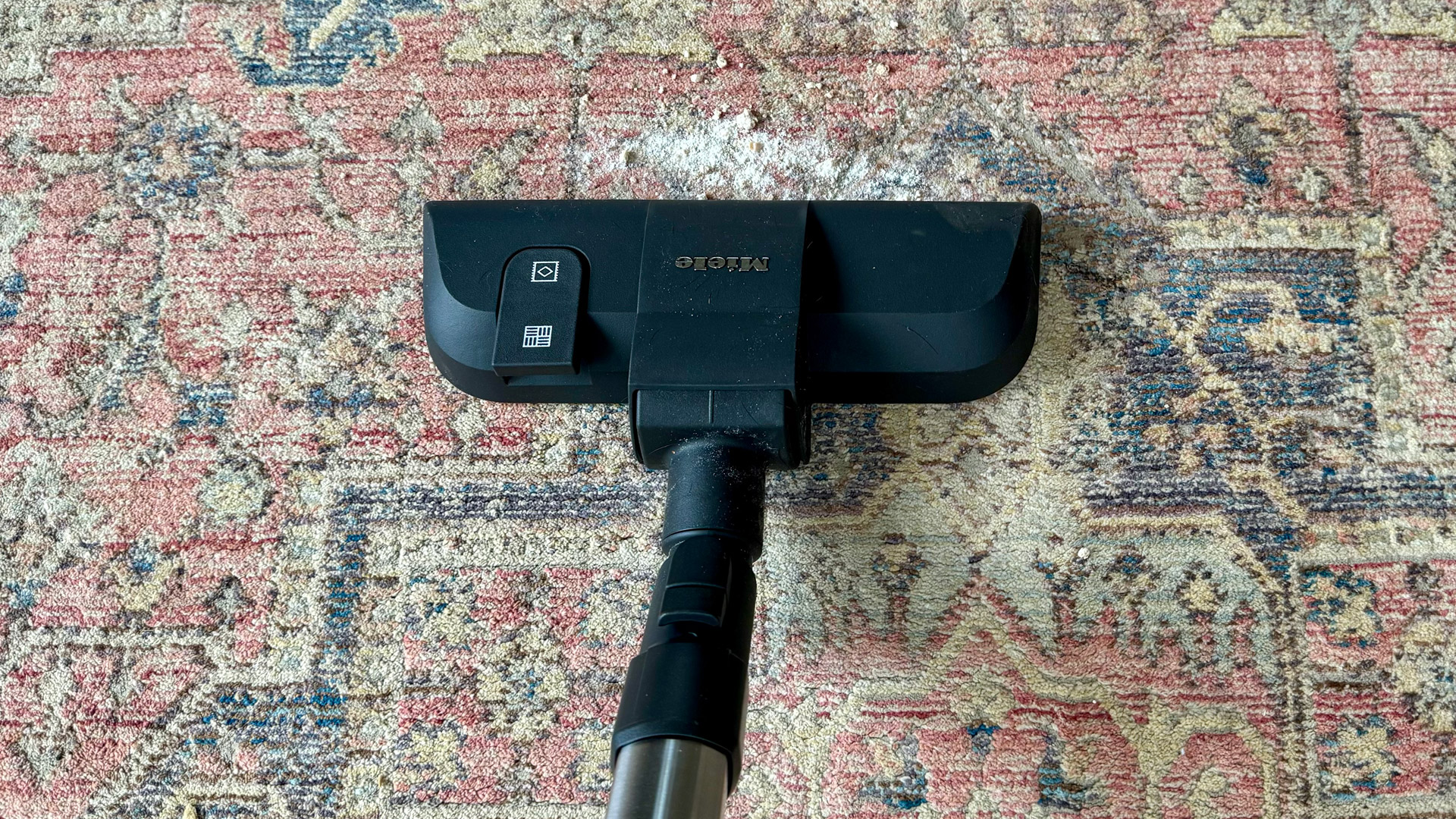
I then proceeded to perform the same test on a medium pile rug and had to reduce the suction to level three – two levels lower than the recommended setting – because the head was impossible to budge. Despite still being very stiff to push, the brush head made a surprisingly good fist of collecting most of the crumbs and all the flour, though I did have to perform a few back and forth sweeps to collect the cornflakes. I also tried the same test with the handle’s suction reduction vent open and this made it easier to push at the expense of a massive increase in volume – from 71dB to 84dB – that made it sound like a jet engine during take off.
As it stands, Miele’s universal floor head is perfectly useable on most hard floors bar, say, delicate polished concrete or premium wood. After all, it picked up all dust – right to the very edge – and most items smaller than an oat flake. However, I’m not convinced that this is the right type vac for carpets or rugs of any depth because it takes far too much effort to push. In fact, I can’t see anyone other than the very fittest managing to finish a single carpeted room without needing to have a little lie down. By comparison to most cordless stick vacs, this specific model’s brush head felt outdated and of another age.
On the plus side, the Miele has oodles of suction power for tasks like vacuuming down the side of sofa cushions, while its extra long and flexible suction tool is one of the very best for sucking up crumbs and crisps between car seats and the center console.
- Performance score: 2.5 out of 5
Should you buy the Miele Classic C1 vacuum cleaner?
Buy it if...
You have a lot of hard flooring
The Classic C1 Flex is a decent performer on hard floors.
You have a lot of rooms to clean
This vac will vac till the cows come home.
You want reliability
Miele is renowned for the high quality of its products.
Don't buy it if…
Your home is mostly carpeted
The Classic C1 Flex’s static brush head is not suitable for carpet.
You don’t want to be tethered to a mains plug
You will need to keep plugging this vac in from room to room.
You don’t have much storage space
The hose and long suction tube make it ungainly to store.
How I tested the Miele Classic C1 vacuum cleaner
Having hauled all parts out of the box, I first tested this model on hard engineered wood flooring using a combination of fine flour and crumbed biscuits, a handful of raw porridge oats and some Crunchy Nut corn flakes.
I then carried out the same test on a medium pile rug. I also gauged the amount of hassle it posed when using it, plugging it into various power outlets and carrying it upstairs and storing it away.
- First reviewed: July 2024
0 comments:
Post a Comment